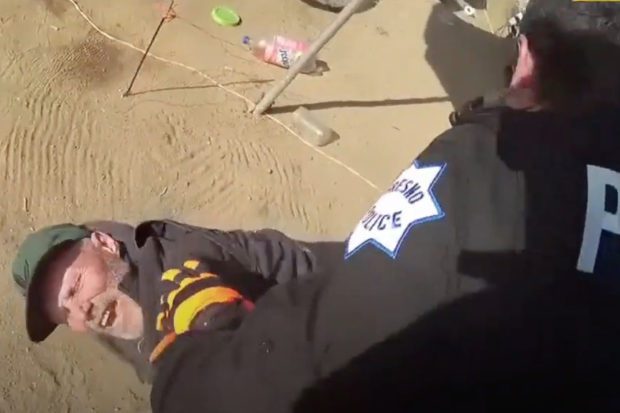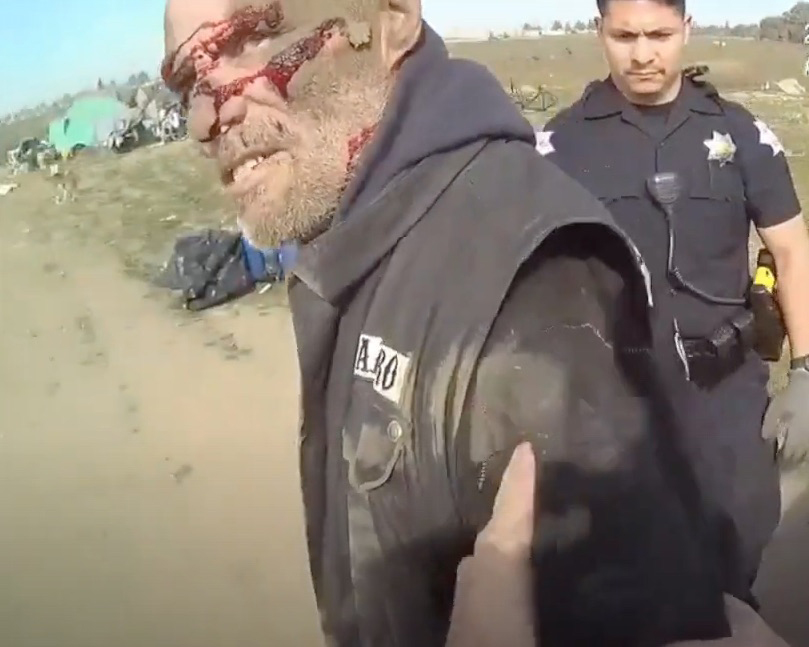

Lewis Brown was living in a homeless encampment near Highway 180 and West Avenue when he was brutalized by several members of the Fresno Police Department.
In a lawsuit filed on Brown’s behalf, attorney Kevin Little writes: “The City of Fresno’s longstanding adversity toward the homeless is exemplified by the facts underlying Mr. Brown’s individual causes of action.
“On February 21, 2020, Mr. Brown disagreed with officers who arbitrarily sought to evict him from the campsite that had been his home for nearly a year, which was not even on City property.
“In response to his protestations, Mr. Brown was beaten up and seriously injured, falsely arrested, wrongfully prosecuted for a year and a half, and had virtually all of his worldly possessions taken and destroyed.
“If Mr. Brown’s unfortunate saga were unique, this case would only be about him. However, it is not. Mr. Brown, therefore, brings this action not only on his own behalf but also on behalf of all others similarly situated.”
The complaint, filed in federal court, seeks to make this a class-action lawsuit. Little says it could take some time for the court to decide whether this qualifies as a class-action lawsuit.
The last class-action lawsuit in Fresno defending homeless people’s rights resulted in a $2.3 million settlement with the City. That case, in 2006–2007, was about city workers taking and immediately destroying homeless people’s property. The settlement money compensated homeless people for the loss of their property and at least temporarily stopped the City from its unconstitutional conduct.
Homeless advocates claim they continue to see City workers taking and immediately destroying homeless people’s property. In response, the Fresno City Council has adopted an ordinance that would prevent homeless advocates and the media from witnessing this demolition with the threat of arrest. The ordinance goes into effect on April 1.
The lawsuit filed on behalf of Brown is viewable on the Community Alliance website (fresnoalliance.com). There is also a link to a video where you can hear Brown tell one of the officers that he is in the process of moving his property and the police officer replying, “Well, you’re not packing fast enough.” A minute later, Brown is on the ground crying out “I can’t breathe.”
According to the complaint, “Sgt. Miller, Officer Holden, Officer Diaz and Officer Quisenberry then used clearly unreasonable and excessive force on Mr. Brown, then a frail 60-year-old.

“Mr. Brown was thrown down to the ground face first, had his legs crossed and raised up behind him toward his waist, had another officer place a knee in his mid-back toward his neck, and had another officer withdraw his firearm. The firearm was at times pointed directly at Mr. Brown’s head.
“One of the officers, believed to be Sgt. Miller, gratuitously walked over and stepped on Mr. Brown. The officers had no reason to believe that Mr. Brown was violent or armed, and they had no reason to assume that a man of his apparent age and health could withstand the force used upon him without sustaining serious injury. This use of force incident was captured on the officers’ body-worn cameras.
“Mr. Brown sustained injuries to his face, knees, back and torso as a result of the defendant officers’ uses of force. Mr. Brown was then hoisted up by his handcuffed arms and taken to another area within the 180 Camp, near police vehicles, even though he still had not been told why he had been arrested.
“When Mr. Brown reached the vehicles he was told to sit down. Mr. Brown explained that he had physical limitations, in addition to having just been brutalized. In response, Mr. Brown’s legs were unceremoniously kicked out from under him, causing him to fall to the ground.”
Asked his opinion about this case of police brutality, Paul Boden, executive director of the Western Regional Advocacy Project (WRAP) in San Francisco, said, “This clearly is brutality—and also happens wayyy too often!
“There are clearly, and it is so often documented like this, two different sets of realities when it comes to policing in this country…There is the wealthy, White, ‘important people’ reality, and then there are the poor and persons of color reality in terms of how police proceed to protect and serve their community.”
Boden recommended that Fresnans advocate to “decriminalize homelessness by supporting the Right to Rest Act [the] next time it comes up in the state [legislature]—or pass a local version and make damn sure police adhere to its mandates.”
In 2007, Jeremy Alderson, director of the Homelessness Marathon, a national radio broadcast, came to Fresno, where we hosted the show. It was like a town hall meeting broadcast live with the mayor and other elected officials in a panel with homeless people and their advocates asking questions.
Alderson, speaking about the current situation in Fresno, said, “I hate to say it, but beating a homeless person has a flavor to it of whipping a slave. Homeless people are already seen as less than human in society’s mind, so it’s hardly surprising that they’re treated that way by police fists. And as was the case with slavery, ending homelessness will require a broad shakeup of the society that’s tolerated it.”
Connecting this situation to what is happening globally, Alderson said, “People in Fresno and everywhere need to understand that these kinds of assaults on homeless people are very much like the 2014 Russian attack on Crimea. They’re not one-offs. They’re warnings of much deeper trouble.”
If you are homeless and want to be a part of this class-action lawsuit, contact the Law Office of Kevin G. Little (1225 E. Divisadero St., Fresno).
City of Fresno Sued Over Homeless Ordinance
Soon, advocates and media personnel will not be allowed to witness and document police and city employees’ activities while conducting a “clean-up” operation at homeless encampments.
Yes, the City will criminalize homeless advocates and journalists for doing their job.
The ordinance establishes a $250 fine and potential misdemeanor charges to those who invade the “buffer area” established by the police and/or city employees while conducting a “clean-up” activity at an encampment.
The ordinance was authored by Council Members Miguel Arias and Luis Chavez, and was scheduled to go into effect on March 31.
But homeless advocates decided to fight back and are suing the City. This effort is led by We Are Not Invisible, an organization headed by homeless advocate Dez Martinez. A second lawsuit has been put forth by the ACLU.
